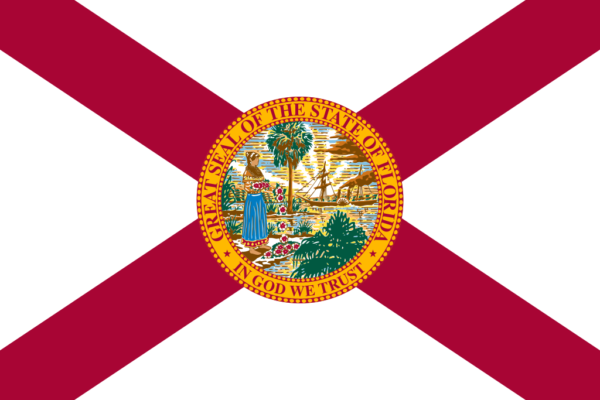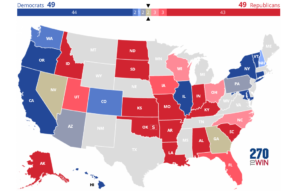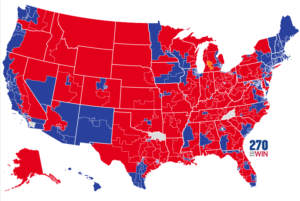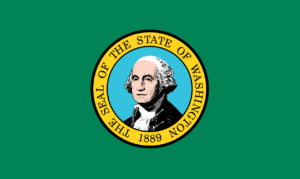As we prepare for the 2020 elections, Yesh Ginsburg and Steen Kirby will give a general overview of all 435 United States House of Representatives races. This is a basic overview to introduce you to the major candidates. All Partisan Lean numbers are taken from the Cook Partisan Voting Index. We will update this page as the races progress if anything noteworthy arises.
Florida is too large a state to put all in one article. We will be splitting the Sunshine State’s 27 districts into three articles. This is one of the most even big states in the country, with 14 Republican districts and 13 Democratic ones. This article contains the first nine districts, which has six Republican districts and three Democratic ones. The second group of districts has the same split, while seven of the final group have Democrats.
Florida’s 1st Congressional District
Incumbent: Matt Gaetz (Republican, second term)
Partisan Lean: R+22
2018 Results:
| Candidate | Votes | % |
| Matt Gaetz (R) | 216,189 | 67.06 |
| Jennifer Zimmerman (D) | 106,199 | 32.94 |
2016 Results:
| Candidate | Votes | % |
| Matt Gaetz (R) | 255,107 | 69.1 |
| Steven Specht (D) | 114,079 | 30.9 |
Republican Candidate:
Matt Gaetz (campaign website)
Gaetz is well-known and a very public and vocal supporter of President Trump. His actions––or antics to his detractors––garner a lot of attention and focus, which he seems to relish in. He’s running on supporting President Trump far more than any personal policies.
Democratic Candidate:
Phil Ehr (campaign website)
Ehr is raising decent money for this race, as anyone challenging such a high-profile Representative would. He is a very moderate candidate, and running on a platform that you’d expect from someone trying to flip a deep red district.
Florida’s 2nd Congressional District
Incumbent: Neal Dunn (Republican, second term)
Partisan Lean: R+18
2018 Results:
| Candidate | Votes | % |
| Neal Dunn (R) | 199,335 | 67.44 |
| Bob Rackleff (D) | 96,233 | 32.56 |
2016 Results:
| Candidate | Votes | % |
| Neal Dunn (R) | 231,163 | 67.32 |
| Walter Dartland (D) | 102,801 | 29.94 |
| Rob Lapham (L) | 9,395 | 2.74 |
Republican Candidate:
Neal Dunn (campaign website)
Dunn is a veteran running on his record, career, and his conservative outlook in a deep red district. He should have no trouble here.
Democratic Candidate:
There is no Democrat on the ballot in November. Kristy Thripp is running a write-in campaign, and Independent Kim O’Connor (formerly of the Green Party) is on the ballot.
Florida’s 3rd Congressional District
Incumbent: Ted Yoho (Republican, fourth term)
Partisan Lean: R+9
2018 Results:
| Candidate | Votes | % |
| Ted Yoho (R) | 176,616 | 57.62 |
| Yvonne Hayes Hinson (D) | 129,880 | 42.38 |
2016 Results:
| Candidate | Votes | % |
| Ted Yoho (R) | 193,843 | 56.56 |
| Kenneth McGurn (D) | 136,338 | 39.78 |
| Tom Wells (I) | 12,519 | 3.65 |
Republican Candidate:
Kat Cammack (campaign website)
With Yoho retiring, his former Deputy Chief won a tight multi-way primary to get the inside track to this seat. She is campaigning on supporting President Trump, a pro-life platform, cutting spending, and other conservative policies.
Democratic Candidate:
Adam Christensen (campaign website)
Christensen is a progressive Democrat, borrowing and modifying Jeremy Corbyn’s campaign slogan. He supports Medicare for All, a Green New Deal with an [implied] federal jobs guarantee, along with plenty of other progressive positions.
Florida’s 4th Congressional District
Incumbent: John Rutheford (Republican, second term)
Partisan Lean: R+17
2018 Results:
| Candidate | Votes | % |
| John Rutheford (R) | 248,420 | 65.16 |
| Ges Selmond (D) | 123,351 | 32.34 |
| Joceline Berrios (I) | 7,155 | 1.88 |
2016 Results:
| Candidate | Votes | % |
| John Rutheford (R) | 287,509 | 70.18 |
| David Bruderly (D) | 113,088 | 27.61 |
| Gary Koniz (I) | 9,054 | 2.21 |
Republican Candidate:
John Rutheford (campaign website)
Rutheford is generally conservative, campaigning on his support for President Trump and other conservative policies. It is noteworthy, however, that he advocates for and supports keeping the more popular parts of Obamacare.
Democratic Candidate:
Donna Deegan (campaign website)
Deegan is a moderate Democrat, campaigning on liberal issues and where she thinks Rutheford might be vulnerable. She is focusing on lowering healthcare costs, middle-path immigration reform, and other moderate policies. She is well-funded and spending a lot in this race.
Florida’s 5th Congressional District
Incumbent: Alfred Lawson (Democratic, second term)
Partisan Lean: D+12
2018 Results:
| Candidate | Votes | % |
| Alfred Lawson (D) | 180,527 | 66.78 |
| Virginia Fuller (R) | 89,799 | 33.22 |
2016 Results:
| Candidate | Votes | % |
| Alfred Lawson (D) | 194,549 | 64.23 |
| Gio Smith (R) | 108,325 | 35.77 |
Republican Candidate:
Gary Adler (campaign website)
Adler is campaigning on bringing American jobs and infrastructure back to the country. He is also pushing for free-market solutions to healthcare, as well as lower taxes. He is not heavily funded for a race that is not expected to be close.
Democratic Candidate:
Alfred Lawson (campaign website)
Lawson is a liberal Democrat, who voted for a $15 minimum wage. He generally campaigns on his liberal record and against President Trump’s actions.
Florida’s 6th Congressional District
Incumbent: Michael Waltz (Republican, first term)
Partisan Lean: R+7
2018 Results:
| Candidate | Votes | % |
| Michael Waltz (R) | 187,891 | 56.31 |
| Nancy Soderberg (D) | 145,758 | 43.69 |
2016 Results:
| Candidate | Votes | % |
| Ron DeSantis (R) | 213,519 | 58.58 |
| Bill McCullough (D) | 151,051 | 41.42 |
Republican Candidate:
Michael Waltz (campaign website)
Waltz is a conservative Republican running on his record as a veteran and a White House policy advisor. He is a more partisan candidate than you would expect in such a relatively close district, but without serious opposition that doesn’t seem to matter.
Democratic Candidate:
Clinton Curtis (campaign website)
Curtis is not spending much and doesn’t seem to be campaigning too seriously, though the general thrust of his campaign seems to be in the “Make America Great Again” style–namely, focusing on idyllic historic things about America and trying to get back to those times.
Florida’s 7th Congressional District
Incumbent: Stephanie Murphy (Democratic, second term)
Partisan Lean: Even
2018 Results:
| Candidate | Votes | % |
| Stephanie Murphy (D) | 183,113 | 57.69 |
| Mike Miller (R) | 134,285 | 42.31 |
2016 Results:
| Candidate | Votes | % |
| Stephanie Murphy (D) | 182,039 | 51.47 |
| John Mica (R) | 171,583 | 48.52 |
Republican Candidate:
Leo Valentin (campaign website)
Valentin is a somewhat conservative Republican, running on supporting President Trump but also with a list of conservative policy proposals. He wants to make HSA accounts available to all Americans, lower taxes and remove small business regulations, and expand school choice.
Democratic Candidate:
Stephanie Murphy (campaign website)
Murphy flipped this seat in 2016, and she is well-funded and looks to hold it now. She wants to lower student loan interest rates and increase loans, and generally touts her bipartisan record and moderate positions on a large variety of issues. She supports a law that requires Congress to pass a budget or it won’t receive its paychecks.
Florida’s 8th Congressional District
Incumbent: Bill Posey (Republican, sixth term)
Partisan Lean: R+11
2018 Results:
| Candidate | Votes | % |
| Bill Posey (R) | 246,483 | 63.11 |
| Corry Westbrook (D) | 127,127 | 32.55 |
| Bill Stinson (I) | 16,951 | 4.34 |
2016 Results:
| Candidate | Votes | % |
| Bill Posey (R) | 218,112 | 60.5 |
| Sanjay Patel (D) | 142,415 | 39.5 |
Republican Candidate:
Bill Posey (campaign website)
Posey is a somewhat conservative Republican who touts President Trump’s endorsement. He is mostly campaigning against the farther left-wing proposals that we see across the country. It is noteworthy that Posey focuses on issues related to outer space more than any other member of Congress.
Democratic Candidate:
Jim Kennedy (campaign website)
Kennedy isn’t campaigning too strongly, nor does he have clearly-defined proposals. He is mostly campaigning on general liberal platitudes, though he does have specific healthcare proposals, and he is in support of paid parental leave.
Florida’s 9th Congressional District
Incumbent: Darren Soto (Democratic, second term)
Partisan Lean: D+5
2018 Results:
| Candidate | Votes | % |
| Darren Soto (D) | 172,172 | 58.02 |
| Wayne Liebnitzky (R) | 124,565 | 41.98 |
2016 Results:
| Candidate | Votes | % |
| Darren Soto (D) | 195,311 | 57.48 |
| Wayne Liebnitzky (R) | 144,450 | 42.52 |
Republican Candidate:
Bill Olson (campaign website)
Olson is a veteran who doesn’t have clearly defined campaign proposals. He is campaigning on general conservative notions and hoping his story and record resonates with voters. Olson is spending a bit in this race, so he’s trying to make it competitive.
Democratic Candidate:
Darren Soto (campaign website)
Soto is a relatively liberal Democrat who focuses a fair bit on Republicans who don’t like things in his record, as well as campaigning against things that President Trump has done.
Overview
Republicans control six of these nine districts, and while some of them might be interesting, most of these races shouldn’t be too competitive in November.
Interested in the rest of our primers for other House races? We have them all listed on our primer home page.







